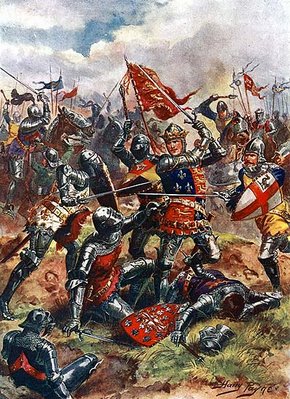DAUPHIN
For the Dauphin,
I stand here for him. What to him from England?
EXETER
Scorn and defiance, slight regard, contempt,
And anything that may not misbecome
The mighty sender, doth he prize you at.
Thus says my king: an if your father’s Highness
Do not, in grant of all demands at large,
Sweeten the bitter mock you sent his Majesty,
He’ll call you to so hot an answer of it
That caves and womby vaultages of France
Shall chide your trespass and return your mock
In second accent of his ordinance.
DAUPHIN
Say, if my father render fair return,
It is against my will, for I desire
Nothing but odds with England. To that end,
As matching to his youth and vanity,
I did present him with the Paris balls.
EXETER
He’ll make your Paris Louvre shake for it,
Were it the mistress court of mighty Europe.
And be assured you’ll find a difference,
As we his subjects have in wonder found,
Between the promise of his greener days
And these he masters now. Now he weighs time
Even to the utmost grain. That you shall read
In your own losses, if he stay in France.
I don't know if this struck anyone else, but the first thing that came to mind when reading the taunting between the French and English was this scene from Monty Python and the Holy Grail. Enjoy! :)
Also, this week we will be starting comedies. I'm reading The Taming of the Shrew, and this is my reading schedule:
01/31 - Background and Act 1
02/02 - Acts 2 and 3
02/04 - Acts 4 and 5




